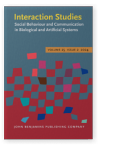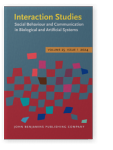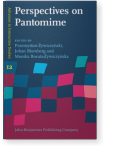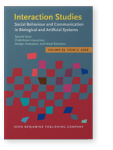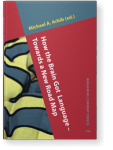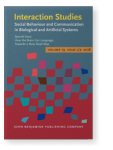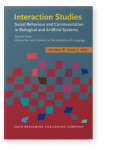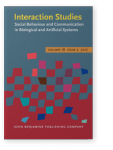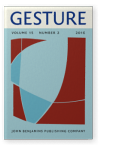Sławomir Wacewicz
List of John Benjamins publications for which Sławomir Wacewicz plays a role.
Journal
2024 Delineating the field of language evolution research: A quantitative analysis of peer-review patterns at the Joint Conference on Language Evolution (JCoLE 2022) Interaction Studies 25:1, pp. 100–117 | Article
Research on language evolution is an established subject area yet permeated by terminological controversies about which topics should be considered pertinent to the field and which not. By consequence, scholars focusing on language evolution struggle in providing precise demarcations of the… read more
2024 Chapter 4. Two types of bodily-mimetic communication: Distinct design specifications and evolutionary trajectories Perspectives on Pantomime, Żywiczyński, Przemysław, Johan Blomberg and Monika Boruta-Żywiczyńska (eds.), pp. 100–114 | Chapter
In this paper, we outline a novel approach to the study of pantomime, through applying the logic of evolutionary signalling theory to analysing the properties of the proposed precursors of language, in particular bodily-mimetic communication. We rely on a classic account by Krebs & Dawkins… read more
2022 What’s in a mime? An exploratory analysis of predictors of communicative success of pantomime Child-Robot Interaction: Design, Evaluation, and Novel Solutions, Couto, Marta, Shruti Chandra, Elmira Yadollahi and Vicky Charisi (eds.), pp. 289–321 | Article
Several lines of research within developmental psychology, experimental semiotics and language origins studies have recently converged in their interest in pantomime as a system of bodily communication distinct from both language (spoken or signed) and nonlinguistic gesticulation. These… read more
2020 The comparative neuroprimatology 2018 (CNP-2018) road map for research on How the Brain Got Language How the Brain Got Language – Towards a New Road Map, Arbib, Michael A. (ed.), pp. 370–387 | Chapter
We present a new road map for research on “How the Brain Got Language” that adopts an EvoDevoSocio perspective and highlights comparative neuroprimatology – the comparative study of brain, behavior and communication in extant monkeys and great apes – as providing a key grounding for hypotheses on… read more
2020 Language origins: Fitness consequences, platform of trust, cooperation, and turn-taking How the Brain Got Language – Towards a New Road Map, Arbib, Michael A. (ed.), pp. 167–182 | Chapter
In this paper, we complement proximate or ‘how’ explanations for the origins of language, broadening our perspective to include fitness-consequences explanations, i.e. ultimate, or ‘why’ explanations. We identify the platform of trust as a fundamental prerequisite for the development of a… read more
2018 The comparative neuroprimatology 2018 (CNP-2018) road map for research on How the Brain Got Language How the Brain Got Language: Towards a New Road Map, Arbib, Michael A. (ed.), pp. 370–387 | Article
We present a new road map for research on “How the Brain Got Language” that adopts an EvoDevoSocio perspective and highlights comparative neuroprimatology – the comparative study of brain, behavior and communication in extant monkeys and great apes – as providing a key grounding for hypotheses… read more
2018 Language origins: Fitness consequences, platform of trust, cooperation, and turn-taking How the Brain Got Language: Towards a New Road Map, Arbib, Michael A. (ed.), pp. 167–182 | Article
In this paper, we complement proximate or ‘how’ explanations for the origins of language, broadening our perspective to include fitness-consequences explanations, i.e. ultimate, or ‘why’ explanations. We identify the platform of trust as a fundamental prerequisite for the development of a… read more
2017 Multimodal-first or pantomime-first? Communicating events through pantomime with and without vocalization Interaction and Iconicity in the Evolution of Language, Hartmann, Stefan, Michael Pleyer, James Winters and Jordan Zlatev (eds.), pp. 465–488 | Article
A persistent controversy in language evolution research has been whether language emerged in the gestural-visual or in the vocal-auditory modality. A “dialectic” solution to this age-old debate has now been gaining ground: language was fully multimodal from the start and remains so to this day.… read more
2017 Adaptors and the turn-taking mechanism: The distribution of adaptors relative to turn borders in dyadic conversation Interaction Studies 18:2, pp. 276–298 | Article
Turn-taking – the coordinated and efficient transition between the roles of sender and receiver in communication – is a fundamental property of conversational interaction. The turn-taking mechanism depends on a variety of linguistic factors related to syntax, semantics and prosody, which have… read more
2016 Visible movements of the orofacial area: Evidence for gestural or multimodal theories of language evolution? Gesture 15:2, pp. 250–282 | Article
The age-old debate between the proponents of the gesture-first and speech-first positions has returned to occupy a central place in current language evolution theorizing. The gestural scenarios, suffering from the problem known as “modality transition” (why a gestural system would have changed… read more
